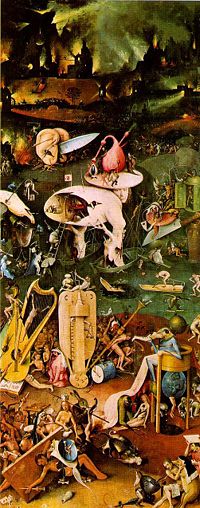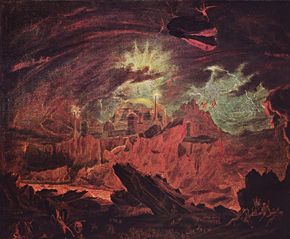Damnation
Damnation is the state of being condemned.
In some forms of Western Christian belief, damnation to Hell is the punishment of God for persons with unredeemed sin. Damnation can be a motivator for conversions to Christianity. The Bible asks: "How can ye escape the damnation of hell?" (Matthew, 23:33). In the Islamic faiths, it can mean condemnation to everlasting punishment in some future state, or the punishment, itself.
The Latin word damnum did not have exclusively religious overtones. From it in English came "condemn"; "damnified" (an obsolete adjective meaning "damaged"); "damage" (via French from Latin damnaticum). It began to be used for being found guilty in a court of law; but, for example, an early French treaty called the Strasbourg Oaths, includes the Latin phrase in damno sit, the equivalent of "would cause harm." From the judicial meaning came the religious meaning.
One conception of damnation is of eternal suffering and denial of entrance to heaven, often described in the Bible as burning in fire. Another conception, derived from the Jewish scriptures referring to Gehenna—often translated as hell—is simply that people will be discarded (burned), as being unworthy of preservation by God.
In Eastern Christian traditions, as well as some Western traditions, damnation is seen as a state of separation from God, a state into which all humans are born, but against which Christ is the mediator and "Great Physician." In some views, no one is damned eternally; but everyone has the opportunity to repent and turn to God, even after they die.
The concept of hell
In many world religions, hell refers to a literal or symbolic place (or sometimes an existential condition) of damnation where the wicked and unrighteous are punished for their transgressions. The concept of hell is prevalent in many religions although its exact description varies from one religion to another. In traditional Christianity, Islam, and the popular imagination, hell is frequently depicted as a fiery pit located underground where souls are tormented by their past sins and demonic forces. Alternatively, hell has been described (e.g., in Dante's Inferno) as a freezing cold and despondently gloomy place. In the Hebrew Bible, Daniel 12:2 proclaims "And many of those who sleep in the dust of the earth shall awake, some to everlasting life, some to shame and everlasting contempt." However, Judaism as a whole does not have a specific doctrine about the afterlife, but it does have a tradition of describing Gehenna—sort of purgatory where one is judged based on his or her life's deeds.
Many moderns describe hell as an existential or psychological state (or condition) of the soul. Modern literary understandings of hell often depict it abstractly, as a state of loss rather than as fiery torture that is literally under the ground. Thus, hell can be seen as the complete and final separation of God's love and mercy from sinners who have rejected his moral standards of goodness and have chosen to live a rebellious life of sin. In this light, the actions which supposedly result in one's soul being sent to hell (i.e. the so called "sins") are precisely those actions that in everyday life cause those states of mind. Hell in the afterlife is but an intensification of the pangs of hell on earth, intensified because the material props of a self-centered life have been removed.
Another issue is whether or not damnation to hell is eternal. Religions with a linear view of history typically depict hell as an endless, infinite abyss; conversely, religions with a cyclic view of history often depict hell as an intermediary period between incarnations (for example, the Chinese Di Yu or the Buddhist Naraka). The widespread notion of purgatory is helpful in reconciling the justice of God with his ultimate mercy upon his children. In this view, sinners spend a finite time either suffering or working to restore themselves, and thus escape damnation.
Despite these variations, the common ground among the descriptions is a place of estrangement and alienation from Divinity, which translates into unbearable pain and suffering.
Damnation in Christian thought

Most Christians see hell as the eternal punishment for unrepentant sinners, as well as for the Devil and his demons. As opposed to the concept of purgatory, damnation to hell is considered final and irreversible. Various interpretations of the torment of hell exist, ranging from fiery pits of wailing sinners to lonely isolation from God's presence.
There are a number of references in the bible claiming where the damned go: "A place of outer darkness where there will be weeping, wailing and gnashing of teeth" (Matthew 24:51; 25:30); "A place to be avoided even if it means losing the physical members of your body" (Matthew 18:8,9); "Prepared for the devil and his angels (Matthew 25:41 cf. Rev. 20:10); "A place where the fire is not quenched" (Mark 9:43-48); "A place of regret, torment in fire and no water" (Luke 16:19-31), and "His winnowing fork is in his hand to clean out his threshing floor and to gather the wheat into his storehouse but the chaff he will burn up with inextinguishable fire" (Luke 3:17).
Most Christians believe that damnation occurs immediately upon death (particular judgment), others that it occurs after Judgment Day. Some believe that virtuous unbelievers (such as morally upright pagans or members of divergent Christian denominations) deserve hell on account of original sin, and even unbaptized infants are sometimes said to be damned. Others make exceptions for those who have not accepted Christ but have extenuating circumstances, such as youth, not having heard the Gospel, mental illness, etc.).
Temporary damnation
According to Catholic belief, immediately after death, a person undergoes judgment in which the soul's eternal destiny is specified. Some are eternally united with God in what is called heaven, often envisioned seen as a paradise of eternal joy. Conversely, others are destined for hell, a state of eternal separation from God often envisioned as a fiery place of punishment.
However, over the years, viewpoints on the final destination of the souls softened. Medieval theologians described the underworld ("hell," "hades," "infernum") as divided into four distinct underworlds: hell of the damned (which some call by the Hebrew word gehenna), purgatory, limbo of the Fathers, and limbo of infants.
Purgatory, according to Roman Catholicism, is a state, process, or condition of "final purification" of souls after death. Other religions have similar beliefs about the possibility of an improvement in the soul's spiritual situation following death, though they hardly ever use the term "purgatory." The word "purgatory" is also used to mean a place or condition of suffering or torment, especially one that is temporary. The Eastern Orthodox Church also believes in the possibility of a change of situation for the souls of the dead through the prayers of the living and the offering of the Divine Liturgy, and many Orthodox, especially among ascetics, hope and pray for a general reconciliation of sinners with God (apocatastasis).
The "limbo of the Fathers" or paradise, is seen as the temporary state of those who, in spite of the personal sins they may have committed, died in the friendship of God, but could not enter heaven until redemption by Jesus Christ made it possible. The term "limbo of the Fathers" was a medieval name for the part of the underworld (Hades), where the patriarchs of the Old Testament were believed to be kept until Christ's soul descended into it by his death through crucifixion and freed them.
The "limbo of Infants" refers to a hypothetical permanent status of the unbaptized who die in infancy, too young to have committed personal sins, but not having been freed from original sin. Since at least the time of Augustine, theologians, considering baptism to be necessary for the salvation of those to whom it can be administered have debated the fate of unbaptized innocents, and the theory of the Limbo of Infants is one of the hypotheses that have been formulated as a proposed solution. Some who hold this theory regard the limbo of infants as a state of maximum natural happiness, others as one of "mildest punishment," consisting at least of privation of the beatific vision and of any hope of obtaining it. The souls of aborted fetuses are sometimes thought to be assigned to this realm as well.
Universal reconciliation
In Christian theology, universal reconciliation, also known as Christian universalism and universal salvation, is the doctrine or belief that all mankind will eventually have reconciliation and salvation through the crucifixion and resurrection of Jesus Christ, which provides reconciliation for all mankind and atonement for all sins. The concept is often called Universalism, but is distinct from Unitarian Universalism.
The doctrine or belief in the salvation of all mankind has been vigorously debated throughout history. Origen (ca. 185–ca. 254), a theologian and one of the most distinguished of the early Fathers of the Christian Church, espoused a Platonic view of eternal souls achieving perfection while escaping the temporary, imperfect material world. He imagined even demons being reunited with God. His views on this matter was not condemned during his lifetime, but were declared anathema in the sixth century. Today, most Christian denominations reject universal reconciliation.
Profane language
"Damnation" (or, more commonly, "damn," or "god damn") is widely used as a moderate profanity, which originated as such from the concept of punishment by God. Until around the mid-twentieth century "damn" was a more offensive term than it is today, and was frequently represented as "D—n," "D---," or abbreviated to just "D." The use of "damn" in Rhett Butler's parting line to Scarlett O'Hara in the film Gone with the Wind in 1939 captivated moviegoers with "Quite frankly my dear, I don't give a damn."
"Damn" is commonly nowadays known as a very mildly profane word and used while cursing or swearing in North America. "God damn," on the other hand, is usually seen as more profane than simply "damn," and in present-day radio or television broadcasts, the word "God" is usually censored or blurred, leaving "damn" uncensored. An example of this is with the 2007 Fall Out Boy single, "This Ain't a Scene, It's an Arms Race."
In the United States, "damn" is also commonly used as an exclamation when an extremely attractive person or object of approval is located; e.g. "Damn, he/she is fine" or perhaps "Damn, he has a nice car!" "Hot damn" may be used similarly, but it is somewhat distinct; for example, if one says, "Joe just won the lottery," a response of "Damn!" on its own indicates disapproval, but "Hot damn!" indicates approval or surprise.
"Damned" is also used as an adjective synonymous with "annoying" or "uncooperative," or as a means of giving emphasis. For example, "The damned furnace is not working again!" or, "I did wash the damned car!" or, "The damned dog won't stop barking!"
ReferencesISBN links support NWE through referral fees
- Edwards, Jonathan. The Justice of God in the Damnation of Sinners. Diggory Press, 2007. ISBN 978-1846856723
- Harold, Frederic. The Damnation of Theron Ware. Public Domain Books, 1994. ASIN B000JMLEX6
- Kresta, Al. Why are Catholics So Concerend About Sin?. Servant Publications, 2005. ISBN 978-0867166965
- Rosen, Michael J. 101 Damnations: The Humorists' Tours of Personal Hells. St. Martin's Press, 2002. ASIN B000FA5TLU
Credits
New World Encyclopedia writers and editors rewrote and completed the Wikipedia article in accordance with New World Encyclopedia standards. This article abides by terms of the Creative Commons CC-by-sa 3.0 License (CC-by-sa), which may be used and disseminated with proper attribution. Credit is due under the terms of this license that can reference both the New World Encyclopedia contributors and the selfless volunteer contributors of the Wikimedia Foundation. To cite this article click here for a list of acceptable citing formats.The history of earlier contributions by wikipedians is accessible to researchers here:
The history of this article since it was imported to New World Encyclopedia:
Note: Some restrictions may apply to use of individual images which are separately licensed.



